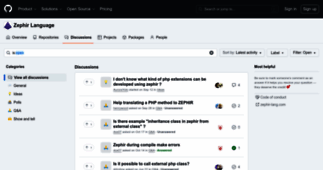Zephir Blog
Enter a key term, phrase, name or location to get a selection of only relevant news from all RSS channels.
Enter a domain's or RSS channel's URL to read their news in a convenient way and get a complete analytics on this RSS feed.
Unfortunately Zephir Blog has no news yet.
But you may check out related channels listed below.
[...] operations are incredibly simple and thus usually faster than common arithmetic operations. Built-In methods for Static Types In Zephir, we have been always promoting object-oriented programming [...]
[...] them work as callbacks: call_user_func(function() { echo “hello”; }); Together with built-in methods you can do amazing and elegant things as: print_r(data->map( [4, 8, 12, 32, 5], [...]
[...] Zephir Clone the repository and run the installer is enough to get Zephir running: Testing Zephir Now, we can create an skeleton for a simple extension: The following files are created: [...]
[...] This screencast explains how to use Zephir to create your first PHP extension. Check a written explanation for this screencast here [...]
[...] if you’re expecting a value from these methods and produce a compiler exception: Branch Prediction Hints Now a developer can specify branch prediction hints. What is branch prediction? Check the [...]
[...] methods are exported as real methods but you don’t have to write them one by one. Return Type Hints Now, methods in classes and interfaces can have return type hints, these will provide useful [...]
[...] generate more efficient code if it knows the value of a parameter is constant or inmutable: Static Analysis Another feature we are implementing is static analysis on conditional assignments. The idea [...]
[...] the skeleton directory also called “utils”. This subdirectory is used to place the Zephir code. Now, let’s create a simple class to test our extension: Enter the extension directory [...]
[...] see the following: Conclusion It’s easy to test Zephir in a Vagrant Box. Check the Zephir documentation to know what more is this language capable of. [...]
Hi, welcome to the Zephir Language official blog. We plan to share articles, tutorials and tips from the community and the Zephir developers. All this [...]
[...] . Strict/Flexible Parameter Data-Types Another feature we’re implementing is strict/flexible parameter data types. In Zephir, you can specify the data type of each parameter of a method. By [...]
[...] operations are incredibly simple and thus usually faster than common arithmetic operations. Built-In methods for Static Types In Zephir, we have been always promoting object-oriented programming [...]
[...] them work as callbacks: call_user_func(function() { echo “hello”; }); Together with built-in methods you can do amazing and elegant things as: print_r(data->map( [4, 8, 12, 32, 5], [...]
Related channels
-
312's Blog
djuqy's blog, kakam's blog, ilul' blog, aan's blog, abeart's blog, leha's blog, makiyet's blog, maman's blog
-
Ara Blog | Arablog.co | Register Free Blog Without Advertisement | Ara Bl...
Free blog, Register blog, Register free blog without advertisement, Free blogging system
-
WORLD TOUR STORIES Alex and Taru sailing around the world.Travel blog. Li...
World Tour Stories - Alex and Taru sailing around the world. Sailing, adventure, cruising, art, life, love, music, photo...

